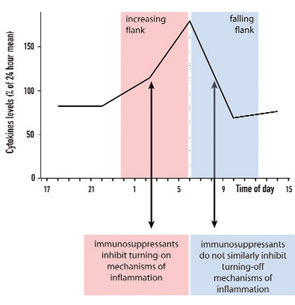Although this study did not attract widespread interest or make the daily press, it stimulated pharmaceutical companies to develop time-release prednisone tablets. Recent data of a double-blind, placebo-controlled, randomized study in hundreds of patients with RA demonstrated a marked effect on morning stiffness and serum IL-6.7 The question appears to be why immunosuppressive treatment with glucocorticoids can inhibit pro-inflammatory sequelae better when given at an early time point, 2 a.m. (on the increasing flank of TNF-α release), than a later one, 7:30 a.m. (on the falling flank of TNF-α release) (see Figure 4, p. 16).

These observations are very important in understanding anti-inflammatory counter-regulation of immune responses. It is has been demonstrated that glucocorticoids induce the transcription of the IκBα gene, which results in an increased rate of IκBα protein synthesis and inhibition of proinflammatory NF-κB effects.8 Other studies have shown that glucocorticoids can interfere with the transcriptional activation potential of DNA-bound NF-κB complexes leading to anti-inflammatory effects.9 These effects appear very early in the turning-on phase of a proinflammatory response (see Figure 4, p. 16). We hypothesize that the turning-on phase of a proinflammatory reaction is much more vulnerable to immunosuppressants than the turning-off phase. This suggests that regulation of an important proinflammatory factor such as TNF-α must occur very early; otherwise an overwhelming secretion of this harmful cytokine will occur.
In view of the circadian rhythm and the impact of the timing of immunosuppressive administration on efficacy, it would be of great interest to explore timed-release forms of cytokine neutralizers (on the basis of small molecules) or hormonal antagonists of melatonin, for example, as therapeutic modalities. Reformulating old drugs in new drug delivery forms could lead to optimized drug release patterns with improved immunosuppressant activities. Stronger inhibition of nighttime proinflammatory cytokines such as TNF-α and IL-6 could reduce RA-related symptoms in the early morning—and possibly, over a long time, to less RA-related co-morbidities such as joint disease, cardiovascular disease, osteoporosis, depression, and sleep disturbances.